Why We Need "Enlightened"
by Michelle Dean, Jane Hu and Maura Johnston
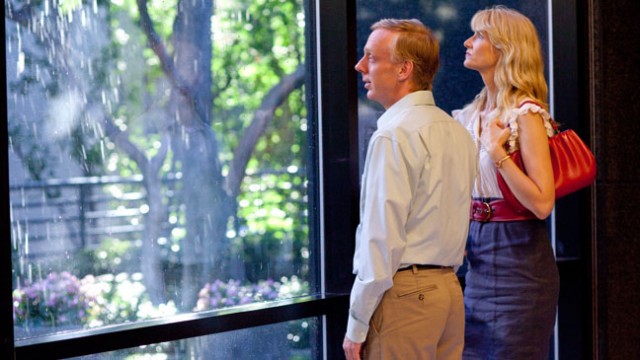
Michelle Dean: We have gathered here today because, and I think this is not an exaggerated term, we are devoted to “Enlightened,” the struggling HBO show from Mike White that stars Laura Dern as Amy Jellicoe, a woman who… is struggling to figure out life. That sounds kind of patronizing, but it’s the only way to put it.
Recently I found myself actively worrying about the show’s potential cancellation as I went about my day. And I keep tossing around different reasons of articulating why. One is of course that like David Haglund at Slate, I think it’s the most interesting show on television right now, as well as the best acted and written and the most aesthetically rich. That sounds so boringly ordinary media narrative-y, but it does feel like the only show where I see a line back to the best of the “prestige cable” shows of the last few years, shows like “The Sopranos” and the better seasons of “Six Feet Under” and “Deadwood.” White’s grasp of people’s interior lives is so much richer than anything else on television. Which of course, lately, I understand to be “unpopular,” because things like the sight gag-driven “Girls” or the pageantry of “Mad Men” are what “we” want.
Jane Hu: I’m generally quite quick to invest in the television I watch, but I’m actually protective of “Enlightened,” getting into frenzied arguments and pleading rants about why it’s so singular and why everyone should watch it. You, reader, why aren’t you watching it right now??
Michelle, I too have been overcome with an increasing concern that the show won’t get the third season it so obviously deserves. That White seemed to be gratefully grasping at any praise the show could get in his HuffPo interview broke my heart: “He deserves better than this!” Suddenly, all other television felt like the enemy. That interview came out a bit over week ago, and since then there’s definitely been a swell in critical attention. Where have all these other viewers been? (Admittedly, I had also been quiet on “Enlightened” until a month ago, when I started rewatching episodes in anticipation for the Todd Haynes-directed one. Please HBO, don’t make me have only these two seasons to rewatch.)
Maura Johnston: I started watching “Enlightened” at the jump, and I remember feeling like it was somewhat falsely advertised in the first season; the posters showed Dern mid-first-episode-meltdown, teasing a show with an unhinged female at the center! and the promise of lunacy! and maybe at least one meltdown a show! Of course, things did not work out that way — the impressionistic first season felt at times like an uncomfortable, if very precisely remembered, dream, with long silences and rich hues draping the suburban Southern California setting; some of the social situations were the stuff of nightmares, the bad dreams that you have where you’re rooted in a place and can’t leave because your legs just won’t move, thanks to all those deeply buried memories and thoughts in your brain that are locking you in place. Laura Dern’s show-bracketing voiceovers had this drowsiness to them, but it was the type of sleepiness that accompanies an awakening, not a drifting into sleep. (The second season is a bit more “plotted,” as it were, and the stark onyx of Abaddonn’s fortress — that’s the company where Dern works — seems to pay visual tribute to the show’s increased dramatic structure.)
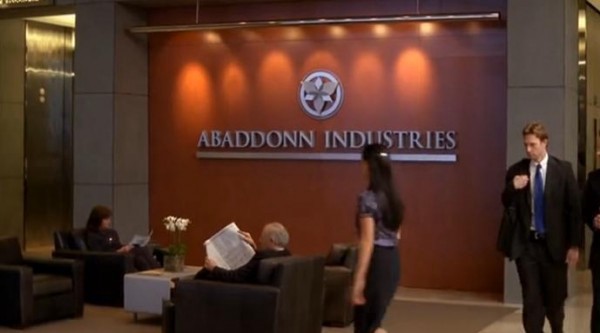
But even though it’s beautifully written, elegantly shot and well-acted (and has made me curl up into a ball at least twice an episode this season), I don’t think it’s too surprising that this show is on the brink — and not just because I have a taste for lip glosses that get discontinued and foodstuffs that I can only find in, like, one grocery store, and maybe only for a few months. I’ve heard people complain that they don’t find Amy “relatable,” and I have to think that’s in large part because she’s a female character who isn’t interested in presenting herself as someone who people have to like. That shit is only reserved for your Don Drapers, your Walter Whites — hell, your Jerry Seinfelds and your George Costanzas, even. In that way “Enlightened” reminds me a bit of “Bunheads,” another show with a Woman Of A Certain Age Who Has Her Own Things Going On at its core; it, too, has low ratings and a question mark hanging over its future. Mike White’s dialogue is certainly slower than Amy Sherman-Palladino’s rapidfire patter, and Amy Jellicoe is more of an out-and-out antihero than Michelle Simms, acting more blatantly in her (sublimated) self-interest and seeming more deliberately divorced from the real world. But both characters are at an age where they should have kids and don’t, where they should have signposts of stabile adulthood and don’t (both are living rent-free, Amy with her mother and Michelle with her mother-in-law), where they should be settled. Neither of them is, though, and watching that struggle is essential to both shows’ driving force.
(Dear HBO: If you do renew “Enlightened,” please don’t take this comparison as an excuse to “suggest” to Mike White that he add a group of dancing teenagers to the ensemble.)
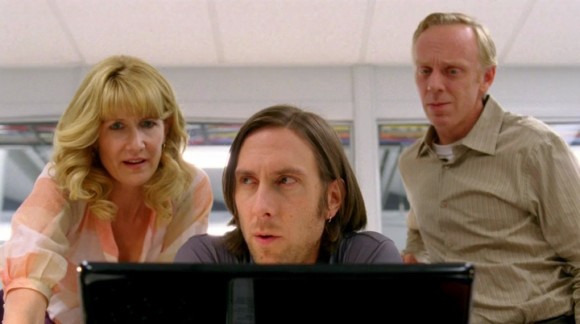
Michelle: I don’t find it hard to understand “why,” exactly, in the sense that I think that things that actually push people, challenge their comfortable assumptions — say, in Amy’s case, that people with her awkward social skills and occasionally arbitrary convictions have no internal lives worth learning about — are not going to be popular, either in terms of high ratings or the kind of ersatz popularity of (oh, I keep coming back to it) “Girls,” where it’s mostly a “conversation” piece, except all the conversations are stupid.
That said I think if and when HBO cancels, it will be their death knell — with me at least, and maybe for others, too — as a purveyor of “television with a difference” or whatever the PR logline was. God, they must be making so much money from subscriptions owing to “Game of Thrones” — and I have the feeling will have a lot more soon as we increasingly move away from cable as the delivery mechanism — that they can support something this tiny as proof of their aesthetic convictions. But they’re not going to.
Maura: Does HBO still even use “It’s Not TV… It’s HBO” as a slogan? You’d think that the channel keeping “Enlightened” on despite its low numbers would be proof positive of that ideal.
Jane: It’s true! I thought keeping “Enlightened” around would be an act of good HBO faith. And for other, though related, reasons, I’ve been wondering this season how much “Girls” has hurt or helped “Enlightened”: the proximity of airing time and the focus on female protagonists felt like it would help, but the media magnet quality of “Girls” that swallows all sources of attention most certainly doesn’t. Well, White answered my question today, in his wonderful Vulture interview:
It’s sort of true about Girls, because it has so much buzz and not great numbers. We have less buzz and less numbers. It actually hurts us. In a way, Girls is the show that they go, “Well, even if the ratings aren’t great …” If Girls was doing huge numbers and we were still doing bad numbers, then we could be more the pro bono case. But Girls is like the pro bono case.
After reading that I felt a little silly; also contrite, because I co-write a blog on “Girls” — with three other people! (Not to turn this into an anti-”Girls” screed, I obviously enjoy “Girls,” as does White.) I think the knowledge that something like “Enlightened” simply existed did something to my naïveté levels, prompting me to believe that maybe the media landscape wasn’t so bad because, hey, Amy Jellicoe’s neuroses and conflicts were getting airtime (inflected through White’s dazzling script no less) and there was even an audience for it! I admit these past few weeks have been an exercise in disillusionment, as though I were replicating a version of Amy’s own narrative — letting go, coming to terms with the blasé attitudes of those around me, feeling a wee bit righteous…
What still disappoints me, though, is how the audience for the underdog “Girls” hasn’t engaged much with the underdog-to-the-underdog “Enlightened.” I mean, HBO put White’s show immediately after Dunham’s — viewers didn’t even have to try. Now there’s a substantial difference between “Girls” and “Enlightened,” I’m aware, but Michelle has made some compelling comparisons between “Homeland” and “Enlightened” as well.
Michelle: Well, to an extent my own references to “Girls” above were calculated to do the same. I find the shows similar only in the most superficial ways. “Homeland” is less so now that the show went in the sort of complete fantasy-world direction.
Jane: Since its first season, “Homeland” has broken so many narrative rules! But what about “Enlightened,” which seems to be its own odd sort of storytelling genre? At times it feels so novelistic (the first-season episode “Consider Helen” was like a short story) so there’s definitely a kind of realism to it, and, as Michelle noted, character interiority is well explored. Then this season White emphasized the cyber-thriller aspect of it — meant to speed up plot — which brought out all these juicy moments illustrating how technology can play out on television. The characters to me are much more consistent than those of most television (that White writes all the scripts likely contributes to this), but what isn’t consistent is narrative perspective: from whose viewpoint are we seeing from, and how, keeps changing.
Maura: “Enlightened” as an episodic series is like a book of linked short stories to me.
Jane: Yes! I describe it as Dubliners but for Los Angeles and its suburbs.
Maura: This might be why it’s so difficult to describe what the show is “about” to people who want a thumbnail sketch of what they’re getting into, and why word of mouth was so slow to spread until the current SAVE THIS SHOW FOR THE LOVE OF GOD frenzy. The through-line is obviously Amy and her reconciling the lessons she learned in Hawaii with her actual day-to-day existence and the people who populate it, but there are so many other things to pick out from it — office-drone life, being a cog in a corporatist wheel, mother-daughter relationships, addiction, marriage. The whole plot of “A Ghost Is Seen,” with Mike White’s character Tyler finding a companion living alone for so long — and the fear that one experiences when one does find a connection with another human being later in life — could be the focus of its own series, really.
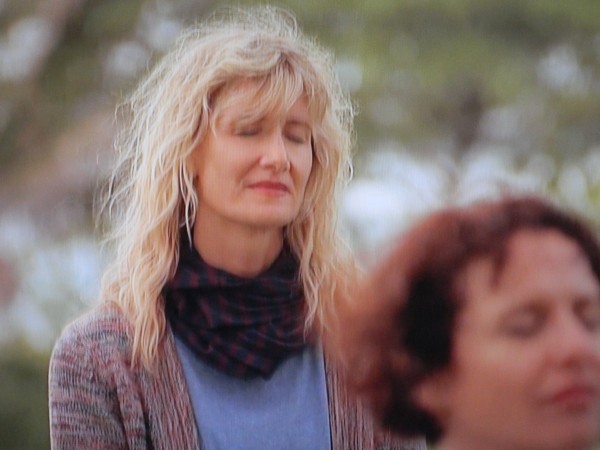
Michelle: I honestly think the reason people are made uncomfortable is connected to the religious aspects of the show. Insofar as it’s, you know, sort of about how to live a good life, and it’s spoken of sometimes as a “New Age satire.” I don’t know that I think Mike White means it as satire, exactly, all of Amy’s voiceover invocations. You’re meant to understand that even though these things all sound clichéd, they are comforting, and you’re meant to respect that Amy draws succor from them even as she’s clearly deluding herself.
Maura: But comfort does come from cliché at times, no? The topic of cliché being helpful to the idea of overcoming addictions has come up on this site before, obviously, and given that Amy sends Levi to Open Air so he can kick his various habits, the connection here is pretty transparent. In the hands of a less delicate writer (and less skilled actors), the “satire” would be a lot more obvious and the show would be a lot more of a clunker. Why the show works so often for me and punches me in the gut is that it engages in a high-wire act — here is a person who could very easily be a punching bag, or the butt of a lot of jokes, and even though if you met her in person she would very likely be annoying and she is downright inconsiderate to people a lot of the time, I feel a genuine sympathy for her, and that comes from how utterly human she is. That’s true for a lot of the characters who fill out the ensemble as well — the painful awkwardness of Tyler, the simmering rage of Dougie, the crystalline sadness inside Helen. (Janice, the poisonous, climbing co-worker played by Michaela Watkins, is one of the few who doesn’t.)
But I see a lot of myself in Amy, that’s for sure, and I don’t necessarily mean that in a good way.
Jane: As much as I believe that those who enjoy the show understand and even relish in how White manages that balance of satire and sympathy, it really is true that most of us come at it from some place of love, or empathy. I see myself in Amy, I adore Tyler because he’s my favorite kind of anxiously quiet outsider, and Dougie is utterly and painfully failing at all attempts to be a clichéd bro that I just want to hold him, or at least share a joint with? It might be a kind of bad empathy or overidentification, but I think that’s part of its magic, as well as why I am losing legitimate sleep over the thought of its cancellation.
“Enlightened” is frequently hilarious — often at the sake of Amy — but it rarely comes off as straight satire, if ever. There’s that thing again, I think, about genre, where the audience expects this HBO show to confirm all their presumptions about the soppy conventions of the self-help movement, but instead they’re faced with a perspective that won’t allow them to do so, at least not easily. The voiceovers place the viewer so firmly (and so melodramatically — Dern’s delivery!) in Amy’s head, and I think if one’s first impulse is to reject her New Age beliefs, that’s difficult. But what’s also difficult, it seems, is just the simple fact of Amy’s vulnerability.
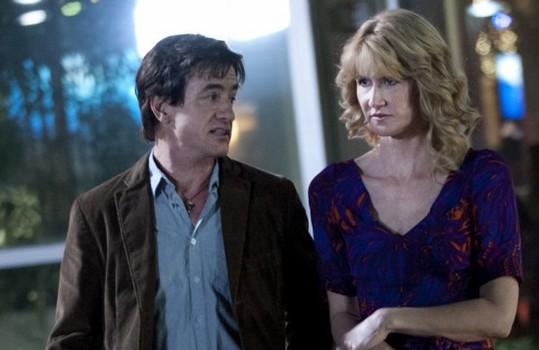
Michelle: The interplay between her vulnerability and the New Age stuff was really tough going this season. Watching her with Dermot Mulroney’s character, whose name by the way I keep thinking of as actually “Dermot Mulroney” because he is himself the only type, the only cipher I think the show has given us, has been killing. me. You keep hearing Amy say that her relationship with him was cementing this perfect new life, but it was clear that the relationship was doomed. And it was clear from small things, the way his affirmations of attraction to her were all half-distracted, non-committal.
Jane: See, that was so difficult to watch! Maybe even more so for us because we’re invested in Amy, and part of the pain in watching comes from a realization that Amy doesn’t see as much as we see. There are all these signs leading up to the episode directed by Todd Haynes where they have sex for the first time — what seemed most peculiar about that particular scene (we all knew it was coming) was that it comes so early in the episode. Like all of Amy’s moments of pristine hope, even if somewhat self-deluded (because how else?), that sex scene sort of sticks out as this odd moment of joy. Last episode, when she sputtered, “I didn’t know all along,” while leaving Jeff’s apartment was possibly even more heartbreaking for the fact that we did.
Maura: I wonder if part of that naïvété, though, is because she doesn’t have lots of experience with other men? In the episode before last, Levi — Amy’s not-quite-ex-husband, played with perfectly tinged pathos by Luke Wilson — freshly returned from rehab and ready to start over with Amy, told her that they’d wanted a life together for 25 years. She’s in her mid-40s at most, which means that they were probably together from the time they were in college, if not high school. She obviously had the affair that kicked off the breakdown at the series’ outset, but her lack of experience in relationships would definitely cause her to see sex as something capital-m Meaningful, particularly with someone who epitomizes the difference-making life that she wants to live. (This may have happened to me with guys in the past. Yes, pluralized.)
Jane: Oof, when Amy tells Jeff she misses him or wants to hang out, and he hems before agreeing to — there’s that split-second in between where Amy senses that he might not be that interested in her — and you realize that of course she’s not deaf to social cues. She’s just a little too bright-sided at times for this world, but THAT’S WHY WE NEED “ENLIGHTENED.” It’s the only show that understands our optimistic impulses, even if they get us in the end.
Amy is someone who wants to believe — who invests so wholly, and attaches so grandly, to the stories she tells herself about, y’know, the Good She’s Going To Do, and the Future Changes She Can Make. She comes back in the pilot as someone who wants to remake herself, as well as remake those around her — but the real interest of the show has been seeing how she’s overextended in her desires and dreams, as well as unable to let anything go.
Michelle: I don’t know that I think she is overextended! Like the funny thing is I think her dreams are relatively concrete; half the pathos of the show is about how the world won’t give her the simpler things, and instead of shrinking she just ramps up her expectations. If Abaddonn had just given her the job she wanted, when she came back from her Hawaiian… rehab, I don’t know that her inner radical would have come out.
Jane:Yes, there’s very much a sort of “Curb Your Enthusiasm” thing going on, where Amy might seem impossible at times, but everyone around is her is just as bad, if not worse. I also mean ‘overextended’ in the sense that she’s both attached to the past (her prior life with Levi and all the dreams therein) as well as trying to find ways of moving forward. Doesn’t the project of “Enlightened” seem to be: how do we move forward if it’s so difficult to let go?
Michelle: Yeah. I mean the funny thing about Mike White’s worldview, given that he was raised evangelical (to an extent, it’s all complicated) is that it is so, so Buddhist. I mean he has said in interviews that he’s a great follower of Pema Chodron’s writings, as I have become too. The thing is, her advice would effectively tell Amy that she has to stop trying to get all this ground beneath her feet. Like she has to stop hoping she will have the perfect career, the perfect relationship, etc., because those things don’t exist and because they don’t matter. Chodron’s teachings are all about learning to live with groundlessness, with not having certainty in your life. With recognizing that what you think of as “certain” — your righteousness, your love with someone else — is actually transient and that holding to it is what’s causing you pain.
Jane: Right! I’ve actually been finding myself trying to trace evangelical impulses that might be underwriting the show just because it is still so clearly a part of how White reads the narrative of his life as a whole. Sometimes, Amy’s neuroses — her anxieties and guilt and struggles of co-dependency — seem to ring of a kind of faith so antithetical to Buddhism. It’s one that wants to do away with doubt, and put stock in retribution. So that’s been a really interesting conflict as Amy strives to follow the dictums in her self-help books.
Michelle: Which is why I think White chose, in the most recent episode, to have the Abaddonn CEO give Amy an answer she totally wasn’t expecting. Because it shook her whole “mission” up, fast.
Though all of that makes me wonder what, if White is given another season, he’ll do to the sweet, solid romantic affair his own character has. Things fall apart, that will too.
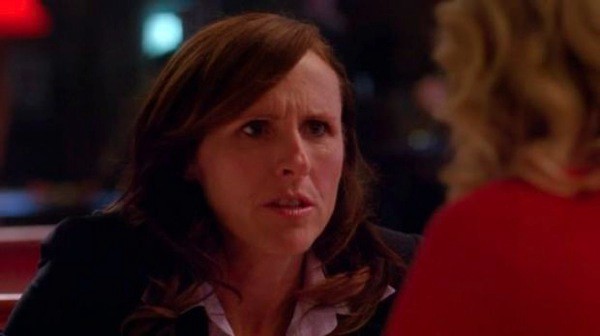
Maura: Noooo! I mean, yeah, you’re right. And of course, if he and Molly Shannon’s character stay employed at Abaddonn — if Abaddonn exists, post-exposé (cough) — that’ll allow White to sketch out even more awkwardly negotiated relationships, and to deal with the emotional fallout of the “ghost” that Tyler was going back to his spectral state.
Jane: It seems too cruelly ironic that, if the show is cancelled, “ghost” Tyler will be forced to become a literal phantom of my counterfactual imagination. I want to see the emotional fall-outs! I want more Molly Shannon’s jazz hands when she accentuates “all the positive.”
There are so many What Ifs in the air right now, that I keep returning to Amy’s voiceovers, unmoored from any specific time or place — it’s in these reflection that we get closest to any ideal of “enlightenment.” They read like poetry, which seems fitting, but they never last long, Amy never inhabits them very long, and I guess part of it is wondering how much these moments structure Amy’s worldview, how much she can structure a life around them. (And look, I’m using “structure” to talk about something that wants to do away with that concept!) But is it enough, especially for the kind of life she still imagines for herself? Especially, as you suggested, when it comes to having a family, that embodiment of The Future?
Michelle: Well, if I may: I really think the title of the show has a silent question mark. Which is not a criticism; I wouldn’t want the question mark to be explicit, somehow, it would ruin it, the way you’re supposed to just get that the concept itself is unstable. The moment you’re sure you’re “Enlightened,” you aren’t anymore.
But that’s probably too subtle a point for people just wanting more gore and shitty sex jokes.
Related: Laura Dern Is Our Only Hope For Bringing David Lynch Back
Michelle Dean writes in a lot of places, now. Follow her on Twitter. Jane Hu still thinks it’s weird that you always wake up as yourself. She twits here. Maura Johnston is the editor of Maura Magazine, a weekly iPad mini-magazine you can subscribe to here.
